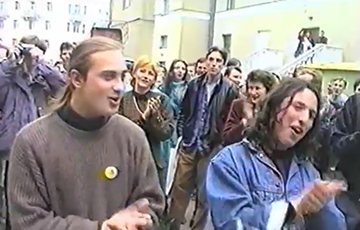Videofact: Belarusian Students Responded To Lukashenka's “Referendum”
11- 14.05.2019, 12:34
- 50,460

The event took place near the residence of the ruler.
On May 14, 1995, an illegal “referendum” was held in Belarus, which radically changed the balance in society, Radio Svaboda reports.
The plebiscite itself was initiated by Lukashenka, elected shortly before, and consisted of four questions:
On granting Russian the status of the state language;
On the change of state symbols;
On support for the President’s actions aimed at economic integration with the Russian Federation;
On introducing amendments to the Constitution that would allow the president to early terminate the powers of the Supreme Council.
The referendum was preceded by a tough confrontation between Lukashenka and the opposition, up to hunger strikes and beating deputies.
Already on May 16, the white-red-white flag, which was hovering on the spire of the building of the presidential administration, was replaced by the Soviet Belarusian red-green one.
The special operation on “state rebranding” was conducted by Lukashenka’s administrator Ivan Tsitsiankou and several of his associates. The officials, who had just come to power, simply tore the historical cloth into pieces on the roof, and the “superintendent” put with a smile his autographs with the date of “the new political era countdown” on these “souvenirs.”
A week later, coat of arms Pahonia was dismantled from the front of the Government House, and a copy of the BSSR wreath was planted in its place.
A day after Tsitsiankou and the company’s performance, youth activists held a rally near the Lukashenka administration: the red-green flag was first raised above the public toilet, and then torn and burned.
“Activists of the Party of Beer Lovers and the Association of Belarusian Students were the initiators, – Siarhei Chyryk says. – A lot of participants were detained then, including me and TV journalist Volha Akulich – I was working for the Krok program at that time. I was lucky that I was a candidate for deputy of the City Council: they not only let me go, but also drove to the place where they had taken me.”
All the attempts of community activists to bring Ivan Tsitsiankou to justice did not bring results. Although, according to the Criminal Code (art. 186-2), such actions were qualified as a crime – “Mockery of the State Symbol”.









